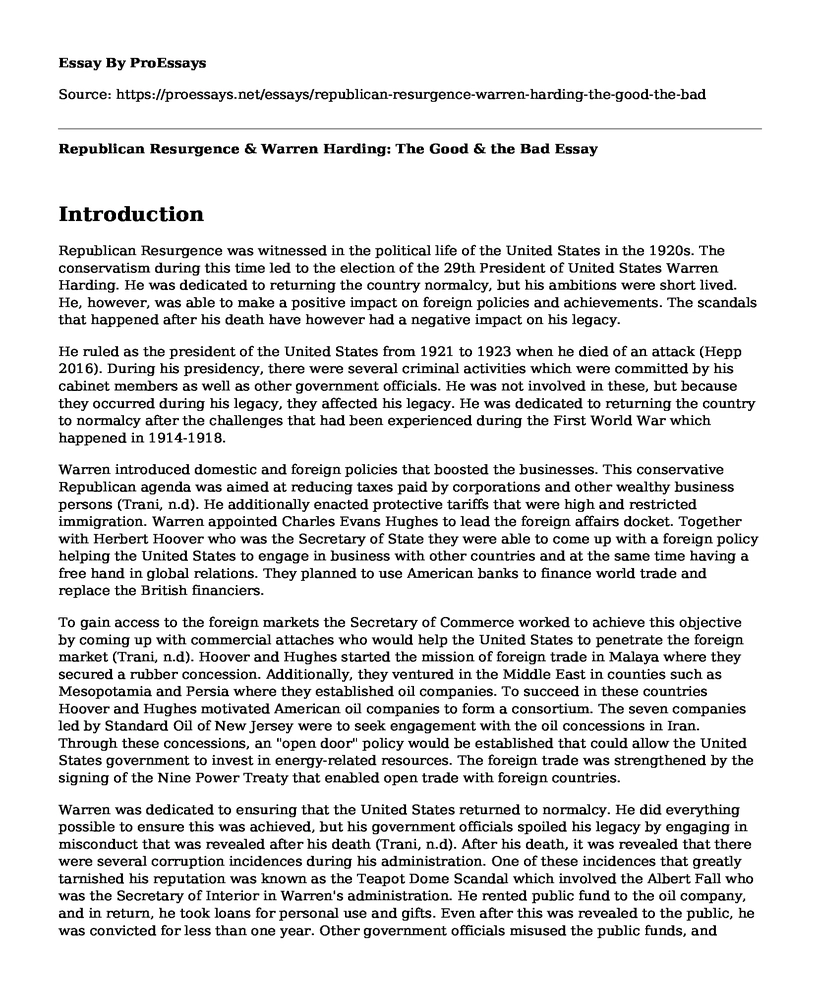Introduction
Republican Resurgence was witnessed in the political life of the United States in the 1920s. The conservatism during this time led to the election of the 29th President of United States Warren Harding. He was dedicated to returning the country normalcy, but his ambitions were short lived. He, however, was able to make a positive impact on foreign policies and achievements. The scandals that happened after his death have however had a negative impact on his legacy.
He ruled as the president of the United States from 1921 to 1923 when he died of an attack (Hepp 2016). During his presidency, there were several criminal activities which were committed by his cabinet members as well as other government officials. He was not involved in these, but because they occurred during his legacy, they affected his legacy. He was dedicated to returning the country to normalcy after the challenges that had been experienced during the First World War which happened in 1914-1918.
Warren introduced domestic and foreign policies that boosted the businesses. This conservative Republican agenda was aimed at reducing taxes paid by corporations and other wealthy business persons (Trani, n.d). He additionally enacted protective tariffs that were high and restricted immigration. Warren appointed Charles Evans Hughes to lead the foreign affairs docket. Together with Herbert Hoover who was the Secretary of State they were able to come up with a foreign policy helping the United States to engage in business with other countries and at the same time having a free hand in global relations. They planned to use American banks to finance world trade and replace the British financiers.
To gain access to the foreign markets the Secretary of Commerce worked to achieve this objective by coming up with commercial attaches who would help the United States to penetrate the foreign market (Trani, n.d). Hoover and Hughes started the mission of foreign trade in Malaya where they secured a rubber concession. Additionally, they ventured in the Middle East in counties such as Mesopotamia and Persia where they established oil companies. To succeed in these countries Hoover and Hughes motivated American oil companies to form a consortium. The seven companies led by Standard Oil of New Jersey were to seek engagement with the oil concessions in Iran. Through these concessions, an "open door" policy would be established that could allow the United States government to invest in energy-related resources. The foreign trade was strengthened by the signing of the Nine Power Treaty that enabled open trade with foreign countries.
Warren was dedicated to ensuring that the United States returned to normalcy. He did everything possible to ensure this was achieved, but his government officials spoiled his legacy by engaging in misconduct that was revealed after his death (Trani, n.d). After his death, it was revealed that there were several corruption incidences during his administration. One of these incidences that greatly tarnished his reputation was known as the Teapot Dome Scandal which involved the Albert Fall who was the Secretary of Interior in Warren's administration. He rented public fund to the oil company, and in return, he took loans for personal use and gifts. Even after this was revealed to the public, he was convicted for less than one year. Other government officials misused the public funds, and Warren's values were questionable as he had an extramarital affair. He also violated the 18th amendment by drinking alcohol in the White House.
Conclusion
In conclusion, Warren was dedicated to promoting domestic and international trade. He appointed officials who spearheaded a policy that would help the United States do business with other countries. However, his reputation was tarnished by corrupt officials, and his values were also questioned for engaging in an extramarital affair as well as drinking alcohol while in the State House.
References
Hepp, J. H. (2016). A Companion to Warren G. Harding, Calvin Coolidge, and Herbert Hoover. Presidential Studies Quarterly, 46(3), 741.
Trani, E. Warren G. Harding: Foreign Affairs | Miller Center. Retrieved from https://millercenter.org/president/harding/foreign-affairs
Cite this page
Republican Resurgence & Warren Harding: The Good & the Bad. (2022, Dec 30). Retrieved from https://proessays.net/essays/republican-resurgence-warren-harding-the-good-the-bad
If you are the original author of this essay and no longer wish to have it published on the ProEssays website, please click below to request its removal:
- Comparing Slave Colonies in the USA and in Caribbean or Brazil
- Sexuality Regulations in Canada Research
- Life for Women in the Ancient and Early Modern World Essay
- Critical Essay on "I Have a Dream" Speech by Dr. Martin Luther King Jr
- The Concept of Government Regulation of Social Media Paper Example
- Treaty of Amiens and Treaty of Tilsit Essay Example
- Essay Example on the Maya Collapse: A Dark Chapter in History







